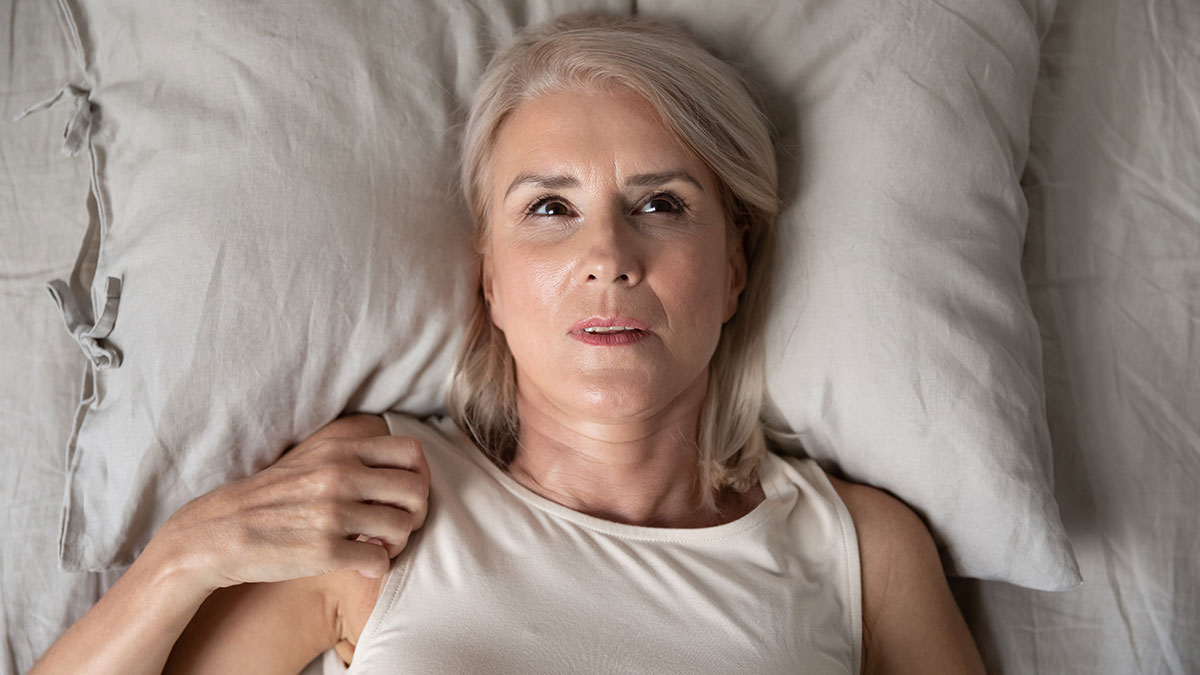When we go through menopause, one of our very first concerns is whether or not we’ll be able to have a menopause orgasm afterward.
With low hormone levels, a decrease in libido, and a number of other contributing factors, you can’t blame us for worrying.
Sex is a big part of life, and a big part of our relationship with our partner. Life after menopause isn’t meant to be sexless.
To ease your overthinking mind early on, the answer to the question is yes, you can orgasm after menopause.
It’s not necessarily an easy ride, though. You have to work for it, know what to and what not to do, etc. Your partner also has to be patient with you and not put any additional stress on the situation.
Be mindful of alcohol, depression, anxiety, emotional strain on a relationship, and lack of desire to have sex, as they may make it more difficult to experience a menopause orgasm. On the other hand, try masturbation, lubricants, vibrators, and foreplay.
Table of Contents [hide]
Low Libido & Lacking Desire
Several health situations can contribute to low libido levels, including but not limited to unbalanced hormones, depression, medical illness, certain medications, strains on a relationship, stress, and anxiety. All of which will be addressed separately.
When you are experiencing low libido levels, there will likely be a slower response to sexual stimulation, both physically and mentally. It may present itself as a disinterest, and it may take longer to become aroused.
These direct effects may be short-term or long-term, only time will tell.
There are solutions to increase female arousal after menopause, though. So, how to get sensation back is the question to ask.
Addyi, what’s known as the “pink pill,” can slightly improve sexual satisfaction according to some studies, but it cannot drastically change the female sexual system. Complicated side effects may happen after consumption, including low blood pressure, fainting, and nausea.
For a real solution, ask your doctor to examine your current medications. Omit any that are not essential for your body.
Then, talk to your partner about how you and your body are feeling to get rid of any built up tension. Communication is key here, especially if you want to start having an orgasm through menopause again.
Decrease in Hormones
Menopause quite literally automatically decreases the hormones in our bodies.
Without an adequate amount of estrogen and testosterone roaming around, we don’t feel the active desire to have sex.
The solution to this problem is hormone replacement therapy, to make sure our bodies are getting the right amount of balanced hormones that it needs. Usually after a few treatments, our levels will go back up, and the sexual desire and responsiveness will return.
Typically HRT takes about three to six months to kick in. And before starting this form of treatment, I’d recommend that you talk all options over with your doctor. Some health effects may come into play depending on the age you go through menopause.
Depression & Anxiety
Depression is a key factor in having minimal sexual desire. And as us women age, it seems to become more recurring and prevalent, considering so many life changes are happening internally and externally.
Personality changes during menopause aren’t that far fetched, either.
Many health care professionals tend to recommend SSRI’s as a treatment method to depression. Fluoxetine and Paroxetine are popular SSRI’s. But again, these medications could contribute to lack of sexual desire.
On top of the body changes and the prescription medications, menopause typically leads to overthinking in some categories of life. For example, job pressure can weigh heavy on us, family responsibilities can trigger us, and worries about our children and parents can seem paralyzing.
All in all, that makes sex the last thing on our minds. But that doesn’t mean we can’t orgasm while going through menopause; once again, it’s a communication thing with your partner.
Strain on Relationships
Menopause does this strange thing to our bodies – it starts to play tricks on our minds.
When we’re in perimenopause, menopause, and postmenopause, we overthink, make things worse for ourselves, and put a strain on our relationships. These can be considered a menopause relationship breakdown.
This strain can cause us to argue more over little things and it can cause us to want to be distant from our partners. Which ultimately means no sex.
Perimenopause and marriage problems is where it starts, but the strain can get worse throughout later stages of menopause if not brought up.
It might not be a pretty situation to talk about or communicate through, but it is one of the easists problems to combat why us women can’t have an orgasm during certain stages of menopause.
Physical Illness
If you’re going through cancer treatments, or any other medical help programs, while you’re going through menopause, the desire for sex will diminish even more.
Physical illness doesn’t make you want to hop into bed with your partner. It makes you want to lay down, all comfy and cozy, and not have to put work into having sex.
I know it sounds bad, but it’s the truth. Think about it; the last time you had a cold, did you feel like being sexual? The same goes for menopause, and the situation may be worse from woman to woman.
Depending on the severity of the situation will depend on the lack of desire – but again, communicate with your partner to see if the two of you can come to a happy medium.
Potential Pain
The #1 cause of vaginal pain during intercourse is primarily blamed on vaginal dryness. Lack of lubrication does not make sex fun for women when they’re going through menopause.
However, there are other reasons that potentially painful symptoms may arise. Menopause loss of sensation is just very popular.
During this stage, your husband doesn’t understand menopause (or at least that’s very likely).
Vaginal atrophy is very common. It often lessens lubrication in the uterine walls, but it also makes the vaginal walls thinner and less elastic. If it’s painful to have sex, why would we have sex?
Urogenital inflammation is another unpleasant experience to go through, where UTI’s and skin conditions around the site of entry can start to irritate the external vagina. Antibiotics and topical creams can often help soothe the pain.
Even though it may be painful, sex is highly recommended to rid the body of pain. It’s kind of like the “use it or lose it” technique.
If you continue to have sex on a semi-regular basis, you’ll keep the walls moist and ready for entry more so than if you completely abstain from sex.
What Role Does Alcohol Play?
Alcohol, in large doses, can actually decrease your libido. A decrease in your libido, more than what it’s already declined, is not what you want to do to your body through menopause.
However, it doesn’t hurt to drink a glass of red or white wine every now and again.
It’s been known that alcohol can play a large role in both male and female sex life – throughout life. It shouldn’t come as a shock to us that it gets worse as our menopause age goes up.
Limit the alcohol intake if you’re trying to maintain a healthy sex life; that’s all there is to it.
Will Foreplay Change Things?
Intensifying and normalizing foreplay during menopause is a great way to get a better sex life and achieve orgasm through this horrendous time of a woman’s life.
If you communicate to your partner and he or she does contribute to sex the way you need them to, the uterine walls will get wet quicker. That means that insertion won’t hurt as much as it did before.
Other additives can help, too, but I find that sticking with the natural option first is the best way to go.
You always have to be honest and see what works for you, though.
Can Vibrators & Lubricants Make Sex More Enjoyable?
Sexually pleasing yourself and sexually allowing your partner to please you are two separate things. But, they’re both necessary to keep up with a normal and healthy sex life.
As far as vibrators go, health care professionals and myself encourage you to use a vibrator on a somewhat normal basis. You’re going to start to go through body and mental changes that may seem weird and different to you, but go with them.
Oftentimes, it will trigger a curious thought process in your mind, potentially making you want to try out new things (like a vibrator, if you haven’t already!).
The vibrations from a vibrator will be super beneficial in a number of ways, including but not limited to increasing blood flow to the area, triggering arousal, and delivering extra estrogen.
On the other hand, vaginal atrophy was mentioned earlier, where irritation, dryness, and swelling of the vaginal tissue may occur. That’s where the lubricants come in.
Forewarning, you may need to narrow down the best lubricant for you and your body based on preference, allergies, and other criteria.
Would Masturbation Help?
As previously mentioned, vibrators are great for discovering your body through menopause along with helping your vaginal walls stay as healthy as they possibly can be.
Vibrators can also be used in unison with sex, if your partner is comfortable with the idea.
You may use other sexual tools and toys, or even your own body to masturbate on a semi-regular basis. It’s all about preference and what works best for you to keep up with a great sex life.












No Comments Add one
Leave a Comment